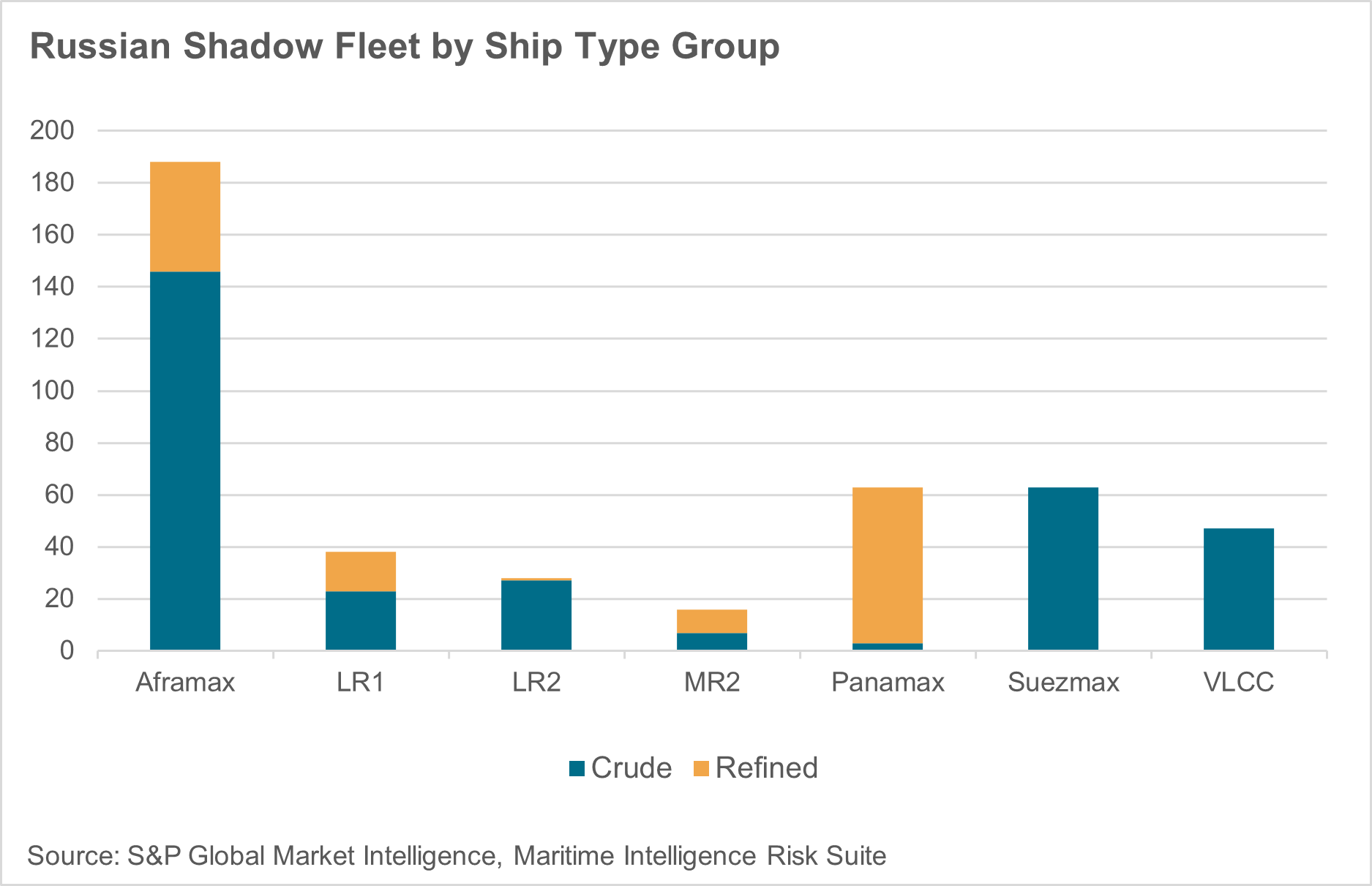Locations of tankers loaded with Russian crude and products as of Monday.
(Map: MarineTraffic) source FreightWaves
From Safety4Sea
The circumvention of sanctions imposed on Russia, one of the world’s top oil producers, has resulted in the environmental and safety hazard that is the “shadow fleet” of ageing tankers that continue oil transfers in secret.
According to Allianz Shipping Safety Review 2023, of the 900 or so very large and ultra large tankers operating worldwide, around 20% were operating in a way that technically breaks sanctions against Iran, Venezuela or, increasingly, Russia.
As reported to the IMO, a fleet of between 300 and 600 tankers primarily comprised of older ships, including some not inspected recently, having substandard maintenance, unclear ownership and a severe lack of insurance, is currently operated as a ‘dark fleet’ or ‘shadow fleet’ to circumvent sanctions and high insurance costs.
The shadow fleet practices dangerous of ship-to-ship transfers in the open ocean, as well as the methods used to obscure ship identities and turning off AIS transponders.
In addition, as brokers Poten had pointed out, to obfuscate the illicit nature of their employment, owners of these tankers frequently change the vessel’s name and ownership and flag them in jurisdictions that are known to be less strict.
Allianz reports that there were at least eight groundings, collisions or near misses involving tankers carrying sanctioned oil products in 2022, such as:In March last year, shadow tanker Arzoyi ran aground off eastern China.
Tanker Petion was involved in a collision in Cuba just days later
In November 2022, oil tanker Linda I was found with severe defeciences and was in contravention of pollution regulations for using high-sulphur marine fuel without an exhaust gas cleaning system.
Recently, in May, the vessel Pablo exploded in Southeast Asia, reporedly killing three crewmembers and washing up oil on nearby shores.
Furthermore, according to international news, a dark fleet tanker called Canis Power broke down recently in the Baltic Sea.
The tanker suffered engine failure in Danish waters in May, while it was loaded with up to 340,000 barrels of oil.
There are a number of worrying scenarios such as a collision with an uninsured shadow vessel that causes major environmental damage.
… said Captain Nitin Chopra, Senior Marine RIsk Consultant at AGCS.
As these tankers are old, not inspected regularly and operate secretly, a major oil spill could be released either by collision, grounding or poor maintenance and human error.
It’s only a matter of time before these tankers cause a major disaster.
According to the IMO, unclear ownership and a severe lack of insurance can also result in a participating shipowner evading its liability under the relevant liability and compensation treaties (e.g.
International Convention on Civil Liability for Oil Pollution Damage (CLC) and the International Convention on Civil Liability for Bunker Oil Pollution Damage (Bunkers Convention).
The fact that they operate in secret causes an important safety risk as well.
These vessels are undetectable and uninsured.
This poses a threat to the integrity of the crew onboard as well as people aboard other ships.
Regulation
IMO Legal Committee, 110th session broadly supported the recommended measures outlined in the original submission, including:
It’s only a matter of time before these tankers cause a major disaster.
According to the IMO, unclear ownership and a severe lack of insurance can also result in a participating shipowner evading its liability under the relevant liability and compensation treaties (e.g.
International Convention on Civil Liability for Oil Pollution Damage (CLC) and the International Convention on Civil Liability for Bunker Oil Pollution Damage (Bunkers Convention).
The fact that they operate in secret causes an important safety risk as well.
These vessels are undetectable and uninsured.
This poses a threat to the integrity of the crew onboard as well as people aboard other ships.
Regulation
IMO Legal Committee, 110th session broadly supported the recommended measures outlined in the original submission, including:
- Flag States are called upon to ensure that tankers under their flag adhere to measures which lawfully prohibit or regulate ship-to-ship transfers, and that such vessels further adhere to the spirit of the safety requirements in IMO conventions and practice safe shipping standards to minimize the risk of oil pollution;
- Flag States should consider requiring that vessels update their ship-to-ship operations manuals to include notifying their flag State when they are engaged in a mid-ocean operation;
- Port States should ensure enforcement of the safety and liability conventions on these vessels and ensure that ship-to-ship transfer operations are conducted in accordance with the applicable safety requirements in IMO conventions; and
- Should port States become aware of any ships “going dark”, they should consider subjecting such vessels to enhanced inspections as authorized, and notifying the respective vessel’s flag administration, as appropriate.
- NYTimes : Fake Signals and American Insurance: How a Dark Fleet Moves Russian Oil
- Politico : Fight against ‘shadow fleet’ shipping Russian oil takes EU into uncharted waters
- FT : Russia assembles ‘shadow fleet’ of tankers to help blunt oil sanctions
- Bloomberg : ‘Shadow Fleet’ of Tankers Hauling Russian Oil Swells to 600 Ships, Trafigura Says
- FreightWaves : Welcome to the dark side: The rise of tanker shipping’s ‘shadow fleet’
- CNN : A mysterious fleet is helping Russia ship oil around the world. And it’s growing
- Windward : Illuminating Russia’s Shadow Fleet
- NYTimes : Fake Signals and American Insurance: How a Dark Fleet Moves Russian Oil
- GeoGarage blog : Russian tanker falsifies AIS data, hides likely activity around Malta and Cyprus / A mysterious fleet is helping Russia ship oil around the world. And it’s growing / Spoofed AIS signals form symbol of Russian invasion


No comments:
Post a Comment